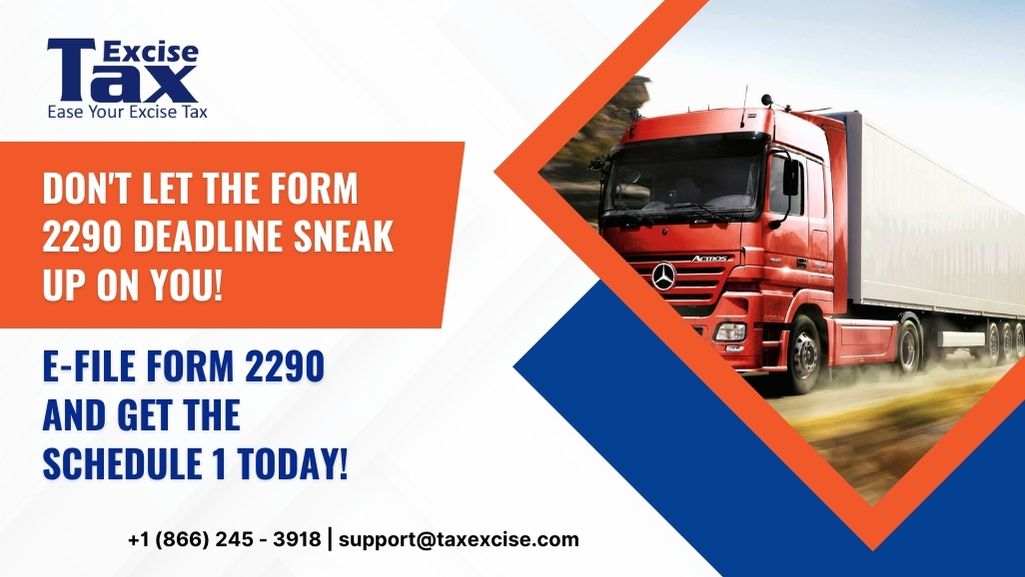Hello, truckers and trucking taxpayers! As we are in the middle of August, you should have already reported your Form 2290 HVUT returns for the new tax period, 2024-2025. If not, don’t delay further; report your Form 2290 taxes to the IRS for your heavy vehicles and get the Schedule 1 copy before the time ends. Staying in compliance with your Form 2290 responsibilities ensures smooth operations of your heavy vehicles and trucks on public highways. However, not all heavy vehicles fall under the same tax bracket. Reporting Form 2290 HVUT is mandatory for taxable vehicles and non-taxable vehicles. All heavy vehicles should have the proper Schedule 1 copy to operate on the public highway. There is another category of heavy vehicles that are entirely exempted from Form 2290 HVUT by the IRS and the Federal government. This blog dives deep into the world of HVUT, helping you determine your tax obligation and navigate the filing process efficiently.

Taxable Vehicles: Filing and Paying your Share of Taxes.
As per the IRS regulations, truckers with heavy vehicles and trucks that come under the taxable vehicle category should report and pay the HVUT reports using Form 2290 every tax year and get the Schedule 1 copy. Heavy vehicles with a total gross weight of over 55,000 pounds and are estimated to run more than 5,000 miles (7500 miles for logging vehicles) on public highways fall under the taxable category. So, truckers must prepare the tax reports according to the total gross weight of their heavy vehicle (category A to V) in IRS Form 2290, report them, and pay them to the IRS within the deadline. If not, they will be subjected to severe actions like penalties, late fees and interest on tax dues.
Tax–Suspended Vehicles: Filing for Tax Suspension, No Payment Required.
Truckers with heavy vehicles that don’t fall under the taxable vehicle category should report Form 2290 as tax-suspended vehicles and get the Schedule 1 copy accordingly. Tax-suspended vehicles are not liable for any Form 2290 tax payments. They just need to file the truck tax reports to the IRS for the particular tax period. Tax-suspended vehicles should be marked under category W in the IRS Form 2290. Usually, vehicles used seasonally and not exceeding the mileage limit during the designated season qualify for suspension.
Tax–Exempt Vehicles: No Form 2290 Required.
Certain heavy vehicles or trucks used for specific purposes and operated by distinct organizations are tax-exempt from the HVUT, which is to be reported using Form 2290. The heavy vehicles or trucks are not subjected to form 2290 truck taxes if they are operated by,
- The Federal Government.
- The District of Colombia.
- A State or Local Government.
- The American National Red Cross.
- Non-profit Volunteer Fire Department, Ambulance Associations, or Rescue Squads
- An Indian tribal government, but only if the vehicle’s use involves the exercise of an essential tribal government function.
- A mass transportation authority is created under a statute that gives it certain powers usually exercised by the state.
Other vehicles that are exempted from form 2290 HVUT are,
- Qualified blood collector vehicles used by qualified blood collector organizations.
- Mobile machinery that meets the specifications for a chassis as described under Specially designed mobile machinery for non-transportation functions.
- Concrete pumps.
E-file Form 2290 HVUT in TaxExcise.com for a Streamlined Approach.
TaxExcise.com is an IRS-approved modernized Form 2290 online e-filing service provider. Our convenient online platform allows you to easily E-file Form 2290 truck taxes without any hassle. You can enjoy tons of benefits by E-filing form 2290 at TaxExcise.com. E-filing form 2290 starts at $29.99 for single-vehicle returns. With the deadline approaching soon, don’t procrastinate! Head over to our website or call our customer support team at +1 (866) 245 – 3918 to learn more about Form 2290 E-filing and start your tax reporting process today. Remember, timely filing ensures peace of mind and keeps your truck compliant for legal operation on public highways.

